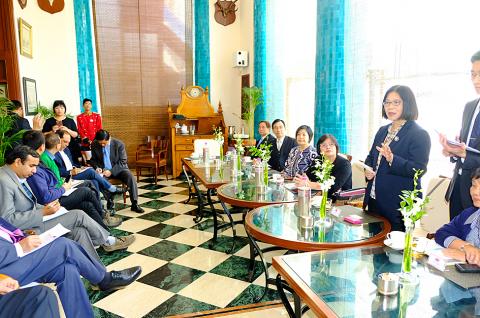China has lodged a diplomatic protest with India over a visit by a legislative delegation from Taiwan, the Chinese Ministry of Foreign Affairs said on Wednesday.
Three Taiwanese lawmakers, led by Democratic Progressive Party (DPP) Legislator Kuan Bi-ling (管碧玲), began their visit to New Delhi on Monday.
Chinese Ministry of Foreign Affairs spokesman Geng Shuang (耿爽) told a regular press briefing in Beijing that China had lodged “solemn representations” with the Indian government over the issue.

Photo: CNA
“We have always been resolutely opposed to any country with diplomatic relations with China having any form of official exchanges — or establishment of any official institutions — with Taiwan. This position is consistent and clear-cut,” he said.
The Indian Ministry of External Affairs said the visit was informal.
“Such informal groups have visited India in the past as well for business, religious and tourist purposes. I understand that they do so to China as well. There is nothing new or unusual about such visits, and political meanings should not be read into them,” the ministry said in a statement.
A DPP official in Taipei said the legislators, who were scheduled to return to Taiwan yesterday, were also in India to visit Taiwanese companies, such as China Steel, Taiwan’s biggest steel maker, which has a plant there.
Despite efforts by China and India to improve ties over recent years, deep suspicions remain, especially over a festering border dispute.
Beijing has increasingly squeezed Taiwan’s international space following President Tsai Ing-wen’s (蔡英文) election last year.
A longstanding African ally of Taiwan’s, San Tome and Principe, switched diplomatic recognition to Beijing in December last year.
“We have been requiring countries which have diplomatic relations with China to fulfill their commitment to the ‘one China’ principle,” Geng said.
Kuan said on Facebook yesterday that while there is also a legislative delegation currently visiting the US and another one that just returned from Malaysia and, by coincidence, met the Malaysian minister of tourism and culture, “China targeted the delegation to India by lodging a high-profile diplomatic protest, despite having said nothing about Taiwan’s other two visits.”
She said Beijing’s strong protest indicates that it does not want to see Taiwan strengthen its ties with India, which could be achieved with Taiwan’s “new southbound policy.”
“India has been a loophole in Taiwan’s diplomacy, and an incredible one,” for India is vital in maintaining Asia’s regional security and has a huge market, Kuan said, adding that Taiwan’s unfamiliarity with India has made exchange tenuous, and Taiwan should therefore be determined to correct the loophole when carrying out the new policy.
Separately yesterday, CS Huang (黃清山), chairman of Nan Liu Enterprise Co, the second-largest nonwoven fabric manufacturer in Asia, said that the company plans to build a factory in Gujarat state, hometown of Indian Prime Minister Narendra Modi.
While traveling with the trade delegation led by Kuan, Huang said that his company would invest US$20 million in the project and sees vast business potential in India.
He expects the factory to be completed in the latter half of next year, adding that once mass production starts, it could generate up to 1 billion rupees (US$14 million) in the first year and 6 billion rupees within the first five to six years.
Additional reporting by Alison Hsiao and CNA

Nipah virus infection is to be officially listed as a category 5 notifiable infectious disease in Taiwan in March, while clinical treatment guidelines are being formulated, the Centers for Disease Control (CDC) said yesterday. With Nipah infections being reported in other countries and considering its relatively high fatality rate, the centers on Jan. 16 announced that it would be listed as a notifiable infectious disease to bolster the nation’s systematic early warning system and increase public awareness, the CDC said. Bangladesh reported four fatal cases last year in separate districts, with three linked to raw date palm sap consumption, CDC Epidemic Intelligence

Two Taiwanese prosecutors were questioned by Chinese security personnel at their hotel during a trip to China’s Henan Province this month, the Mainland Affairs Council (MAC) said yesterday. The officers had personal information on the prosecutors, including “when they were assigned to their posts, their work locations and job titles,” MAC Deputy Minister and spokesman Liang Wen-chieh (梁文傑) said. On top of asking about their agencies and positions, the officers also questioned the prosecutors about the Cross-Strait Joint Crime-Fighting and Judicial Mutual Assistance Agreement, a pact that serves as the framework for Taiwan-China cooperation on combating crime and providing judicial assistance, Liang

Reports of Taiwanese going missing, being detained or interrogated, or having their personal liberties restricted in China increased about fourfold annually last year, the Mainland Affairs Council (MAC) said yesterday. Last year, 221 Taiwanese who traveled to China were reported missing, were detained and interrogated, or otherwise had their personal freedom restricted, up from 55 the previous year, the council said. Reopening group tours to China would be risky, as it would leave travelers with no way to seek help through official channels after Beijing shut down dialogue between the associations tasked with handling cross-strait tourism, the MAC said. Taipei’s Taiwan Strait Tourism

SHIFT: Taiwan is evolving from a transit stop into a tourist destination, with more international travelers willing to spend on tours, dining and cultural activities Taiwan rose three places in the World Tourism Barometer to 36th globally in 2024, with international tourism revenue of US$10.028 billion, the Tourism Administration said on Monday. The UN Tourism Organization publication said that its focus has switched from whether a country has returned to pre-COVID-19 levels of tourism to the amount spent by a tourist during an overseas trip. The nation last year welcomed 8.57 million international tourists, about 9 percent more than in 2024, with most tourists coming from Japan, South Korea, and Hong Kong and Macau, all of which accounted for at least 1 million tourists each. During the first